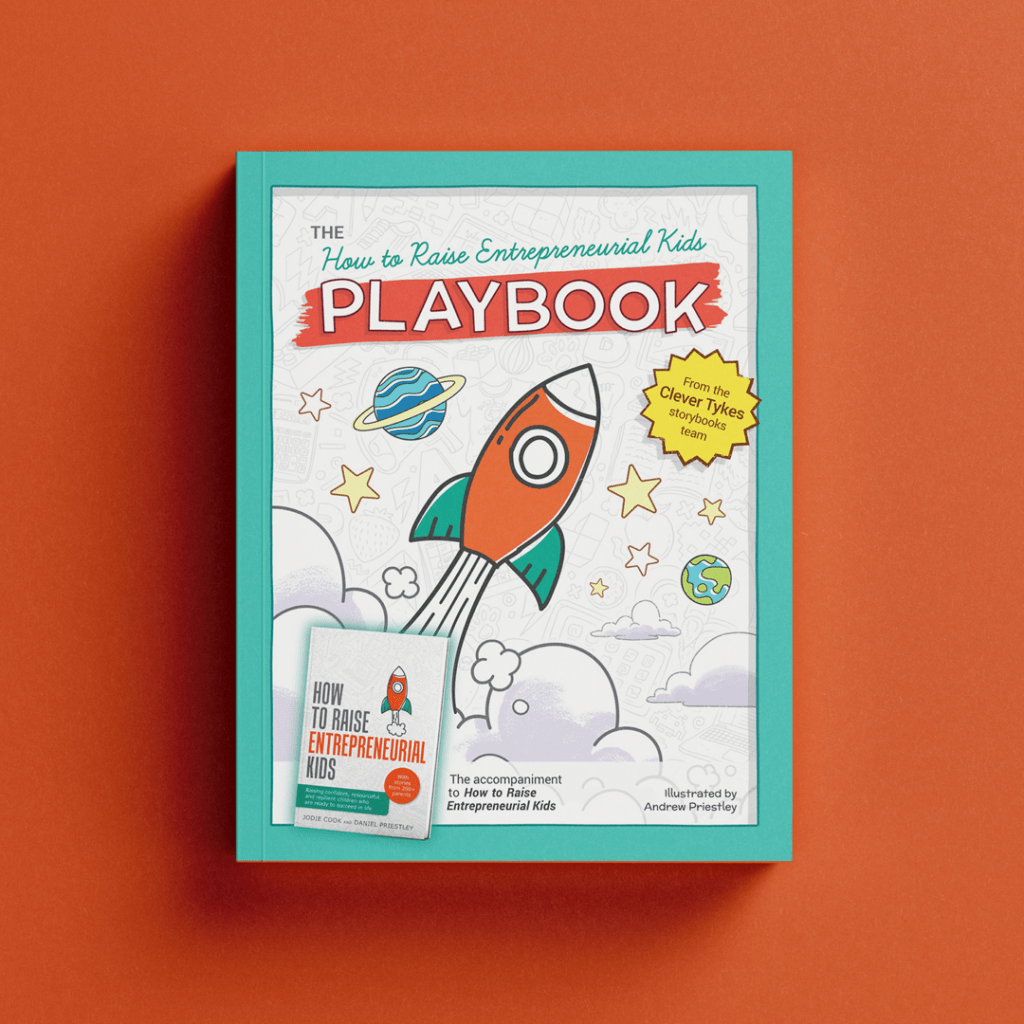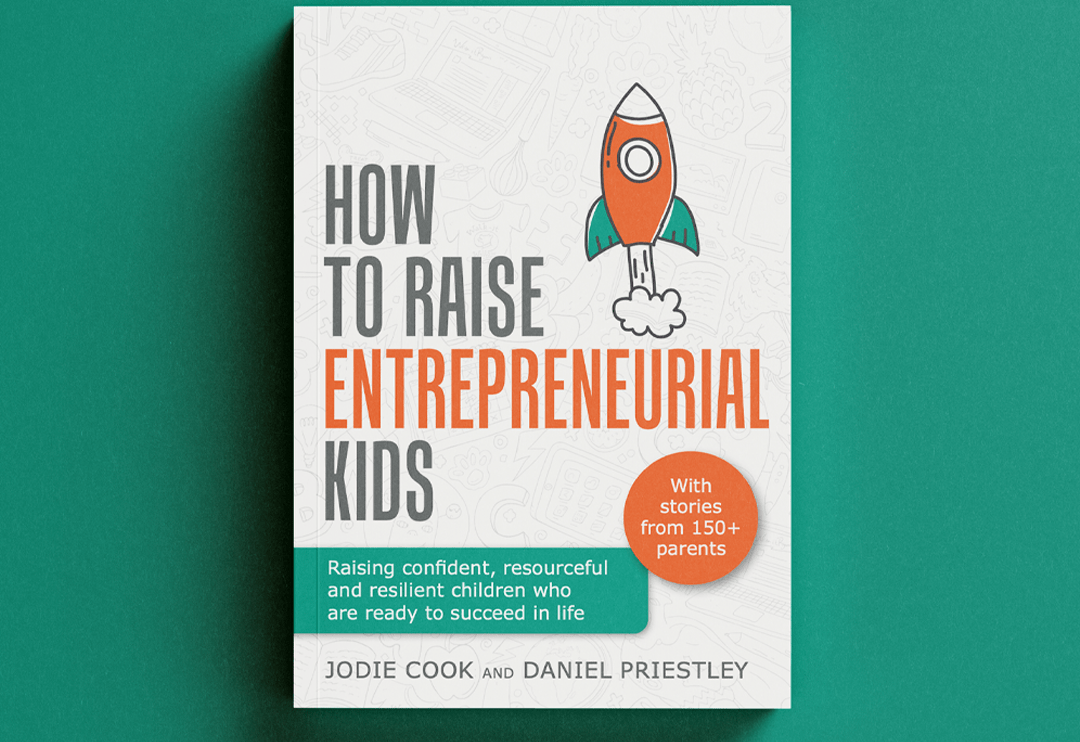What do you do when you make a mistake while walking your neighbor’s dog? How do you turn a passion for technology into coding a playable game? These are some of the questions presented by the Clever Tykes storybook series. These children’s books are meant to encourage entrepreneurship, creativity and resourcefulness from a young age. Jodie Cook, Co-Founder of Clever Tykes and Founder of JC Social Media, recently released a new book from the company: How To Raise Entrepreneurial Kids.
Cook, along with co-author Daniel Priestley, wrote this as a guidebook for parents who want to help their children develop crucial skills that may not be covered in school. We spoke with Cook to learn more about the company and its mission. In our interview, Cook shares her thoughts on the importance of role models who can foster an entrepreneurial mindset.
How Clever Tykes Was Founded
“Clever Tykes was founded to create entrepreneurial role models for kids. I realized that when I met people who had started their own business, they could always point to a role model that had inspired them and made them believe it was possible for their own journey.
“Through research, I found that self-employment often runs in generations. I also found that unemployment often runs in generations. Someone is more likely to follow the path of their parents because that’s what they are familiar with and unconsciously emulate. Their parents become their most prominent role models.

“I was twenty-two when I started my social media agency and, at the time, none of my friends had started businesses. My mum had been self-employed for most of my teenage years, and I grew up understanding her work and how she marketed, secured clients and delivered services. She had involved me in projects at her work and been an example of independence and professionalism herself. This was huge in how I viewed starting up, because by the time I was twenty-two it was second nature for me.
“I looked for the entrepreneurial role models that someone might have if they didn’t have a self-employed friend or family member. On the television and in the media, entrepreneurs or people in business tended to be portrayed negatively. I saw Matilda’s dodgy car-dealer dad, Mr. Burns from The Simpsons, Lord Business from The Lego Movie. Even the dragons on Dragons’ Den (or the sharks in Shark Tank) were portrayed as mean, scary people.
“None of the business owners I knew were mean, greedy and scary! So where were the positive, entrepreneurial role models? That’s when I decided to create them.”
The Clever Tykes Storybooks
“The Clever Tykes storybooks and resources introduce entrepreneurial role models to 6-9-year-old children, and they inspire changes in behavior including resourcefulness, resilience and creativity.
“Parents describe the books as like ‘flicking a switch’ in the minds of their children. One of my favorite reviews is from Eva’s mum, who said that since reading the Clever Tykes books Eva (age 7) had gone from having tantrums and feeling defeated when presented with challenges, to finding creative ways to overcome obstacles. Eva was now much happier going about her day-to-day because far less was able to change her mood. She became confident in her own ability to work things out: an essential quality of a future entrepreneur!
“After the Clever Tykes team wrote, illustrated and produced the books, we started selling them on Amazon and we managed to get them stocked in high-end department stores Harrods and Selfridges. Seeing them on the shelves was an exciting moment, but something didn’t feel quite right. Because the books were designed to be a tool for social mobility, we needed to reach the kids whose parents didn’t shop at Harrods or Selfridges.
“It was then that we set about finding a sponsor. We had a dream that we could find a company, perhaps a bank or airline or supermarket, to sponsor the books and resources into all 24,000 primary schools in the United Kingdom. All our energy went into finding that sponsor and we started by telling everyone we knew what we were looking to do. We’d have meetings with people just to get that goal on their radar; not because we were trying to sell to them, but because we thought they might meet someone whose goals aligned with ours who might become our sponsor.
“That’s exactly what happened. Craig, a friend of a friend of a friend, became our friend, and then Craig met someone at an event. That someone was Martin from Lloyds Banking Group who was, at the time, looking for projects with a social mobility agenda. We met Martin, shared the vision and what it could mean, and between us we made it happen. During January of 2017 the Clever Tykes storybooks and resources were gifted to all 24,000 primary schools in the United Kingdom.”

Writing How to Raise Entrepreneurial Kids
“In 2018 I used HARO (Help A Reporter Out) to submit two questions. One was ‘How are you raising entrepreneurial kids?’ and the other was ‘How were you raised to be entrepreneurial?’ I wanted to collect stories from entrepreneurs and parents that I could turn into blog posts for Clever Tykes.
“To my amazement, within a few days of these requests going live, I had over five hundred responses. They included some incredible stories in answer to the two questions. Unsure at first of what to do with these tales, I read them all and grouped them into similar topics. I then decided they should be turned into a book and the book should be called How To Raise Entrepreneurial Kids.
“I had spoken on stage with Daniel Priestley at an event a few years previously and we had kept in touch. Daniel runs an entrepreneur accelerator and has written four books on the entrepreneur journey. Plus, he’s raising three kids of his own. I thought he would be the perfect co-author, and I called him to pitch the project. He said yes straight away and arranged a call with his publisher, who said they would be happy to publish the book.
“We created a structure for the book based on four pillars: entrepreneurial mindset, entrepreneurial skills, entrepreneurial opportunities and the parent-mentor. Each pillar contains smaller sections relating to key aspects of raising entrepreneurial kids, for example: dreaming big, practicing, family alignment, pitching, selling, making mistakes and reflection. The forty-six sections each contain some of the stories from parents and entrepreneurs as well as actionables to try together as a family.
“The book is not there to give advice on how to parent; we know there are as many ways to parent as there are children! Instead, it’s about sharing stories and giving ideas of discussions or exercises that can spark new ideas and lead to amazing discoveries and opportunities that will set someone up for a bright and happy future, whatever that future involves. There’s a big difference between raising entrepreneurial kids and raising kid entrepreneurs and the book focuses on the former. Any specific business actionables are based around the concept of ‘playing businesses’ and experimenting.
“One of the stories, in the section about cultivating long attention spans, is from a family intentionally ‘doubling down’ on its kids’ interests. Matthew Burnett from Super Genius Inc, explains:
“With my own son, at a high level, I think the main thing we’ve done is to really just follow his instincts and interests and just use those as a platform for encouraging an entrepreneurial mindset. It’s really a classical education move; if your kid says they are really into sea turtles you know you just kind of double down on sea turtle stuff! My wife and I both work for ourselves so I imagine there’s a certain amount of ambient ‘entrepreneur talk’ around the home that probably helps, but I feel like the real secret has been just paying close attention to his questions and interests and using those to inspire him.“
“The feedback from readers of How To Raise Entrepreneurial Kids has been brilliant, with parents commenting how they are excited to try out the discussion topics and ideas the book presents, and they can already see the huge difference the book can make to someone’s future.”
Learning through the Playbook

“The How To Raise Entrepreneurial Kids: Playbook takes the themes from the book and turns them into specific exercises, discussions and questions. Each section addresses a key concept in developing the skills and attitude of a young person ready to take on the world and includes questions to ponder and exercises to complete together as a family, with spaces to fill them in.
“It includes exercises such as creating a family mission statement, journaling at the end of a day, planning ahead, learning from mistakes, differentiating between what’s in and out of your control and quizzing family members about their journeys.
“The playbook develops self-awareness across the four pillars of raising entrepreneurial kids. It teaches someone how to question. It encourages them to think and make choices on their own. Self-awareness is a powerful tool in a young person’s toolbox and it will serve their future no matter what they choose to do.”
The Importance of Encouraging Entrepreneurship
“Relying on a school to teach a child everything they need for a happy and prosperous future is nonsensical. Schools train kids to pass exams, not necessarily think for themselves or develop their confidence and resourcefulness.
“According to the article ‘The Influence of Home on School Success‘, by the time a child is eighteen, less than 14% of their waking hours will have been spent in school. That leaves plenty of time to educate, influence and shape mindsets and actions outside school time.
“Equipping someone with the skills associated with entrepreneurship will serve them well even if they don’t choose to start their own business. The mindset and skills required of work in the next few decades will be very different to those required today, and the kids in schools right now will be doing jobs that haven’t been invented yet. We’ve seen with 2020 that adaptability is key, as is a growth mindset, resilience, and being able to take considered action under pressure. How To Raise Entrepreneurial Kids equips someone to thrive no matter what the future might hold or what an individual’s version of success looks like.
Final Thoughts and Ways to Connect
“At the moment we are focused on How To Raise Entrepreneurial Kids and its accompanying playbook. Daniel and I love seeing reader pictures and hearing stories of the discussions and ideas that have been sparked as a result of something in the book. We share them via @clevertykes on Instagram.
“We have created a raising entrepreneurial kids scorecard that you are welcome to complete.
“If you have a story to share, of how you were raised to be entrepreneurial or how you are raising entrepreneurial kids, you can tell us that too. We share stories from our Instagram. Submit your story and take the scorecard here.”







Add Comment